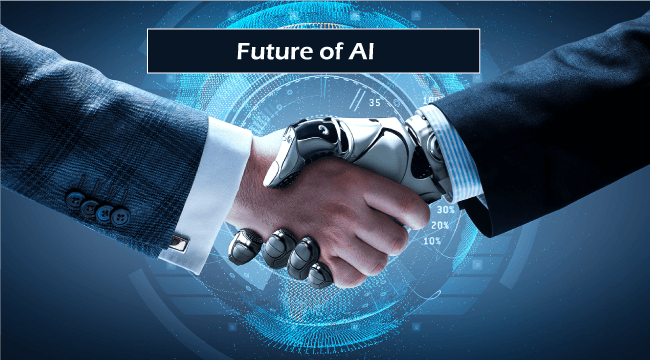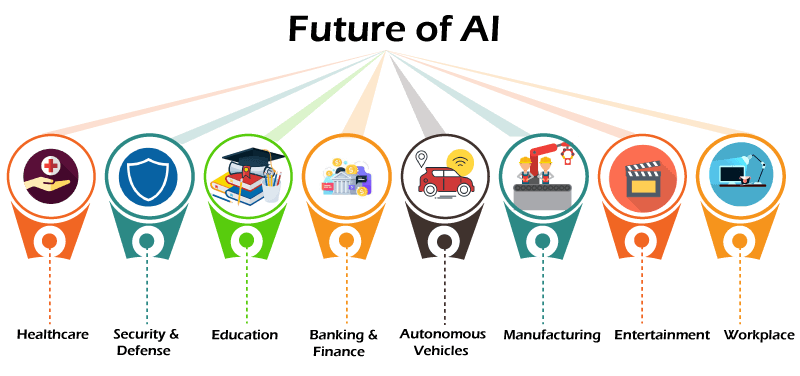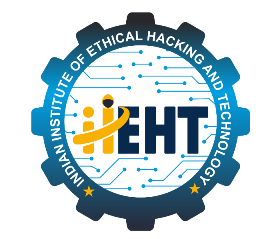Future of AI
Date: Feb 21, 2023

Cyber Security
Introduction
Artificial intelligence (AI) is unquestionably a cutting-edge area of computer science that is poised to dominate a number of burgeoning industries, including big data, robotics, and the internet of things. AI has gone from science fiction to reality in just a few years. Intelligent machines that assist humans exist in the real world as well as in science fiction films. We now inhabit a world of artificial intelligence, which was only a story a few years ago. Whether deliberately or unknowingly, we use AI technology in our daily lives, and it has somehow ingrained itself into our way of existence. Everyone uses artificial intelligence in their daily lives, from chatbots to Alexa and Siri. The advancement and growth of this technology are occurring quickly. But it wasn't as seamless and simple as it seemed to us. To get AI to this point, a lot of time, effort, and contributions from many different people have been required. Due to its revolutionary nature, artificial intelligence also faces numerous debates regarding both its potential and potential effects on people. Both defensive and offensive cyber operations will benefit from the use of AI. In order to exploit specific weaknesses in AI technology, new cyberattack techniques will also be developed.
AI in Daily Life
The future of business is frequently debated in industry circles as becoming AI. However, if we take a closer look, AI is already present in many facets of our daily lives.AI has created a name for itself in a variety of industries, including smart home gadgets, digital assistants, video streaming devices, self-driving cars, banking and finance, healthcare, e-commerce applications, and security and surveillance systems. It helps us with many aspects of life, from parking our car to answering emails. When Google Maps assists you in choosing the quickest route to your location, AI is at work. The effect of AI is clear in everything from product recommendations to friend suggestions in your social media feeds. In summary, AI and its use have advanced more quickly and widely than we had anticipated. In the upcoming years, it is anticipated that application cases for AI will increase dramatically due to the increasing data expansion, stronger algorithms, and advanced computing capabilities.
Other Industry Disruption
AI-powered technologies can analyse enormous volumes of data far more quickly than the human brain can. It can work around the clock with maximum efficiency and significantly reduce the amount of time needed to finish a task. As a result, we are able to make better decisions since it lets us foresee the potential outcomes of each action. The value of AI is enormous across businesses due to its many benefits. Multiple other industries have also been dramatically transformed by AI developments. The healthcare industry is a fantastic example. In some sectors of healthcare, it has been able to outperform human talents. Healthcare companies can create creative solutions that guarantee better health outcomes by utilizing AI technology. The impact of AI on healthcare is growing swiftly, from increased diagnostic accuracy to shortened drug discovery times.
Increased Economic Activity
The ability of AI to quickly and effectively extract useful insights from a vast amount of data is perhaps its greatest asset. This capability becomes a highly valuable tool for businesses. Not to add that AI is now the hub of innovation for firms that are looking ahead. The demand for AI is growing rapidly on a worldwide scale. It was estimated to be worth USD 39.9 billion and was expected to grow at a 42.2% annual pace from 2020 to 2027. Top tech companies are investing billions in developing solutions that rely on this potent technology, including Microsoft, Google, Apple, Facebook, and others. More AI-enabled technologies being used means more economic activity. According to a McKinsey analysis, AI can generate $13 billion in additional global economic activity.
AI's effects on society
On society more generally, the development of AI is anticipated to have a more favourable effect. Healthcare is already benefiting from AI-enabled solutions' improved results. Our efforts to reduce traffic congestion are aided by creative AI-based transportation applications. In order to solve crimes and uncover illicit activity, facial recognition technology is being employed more and more. AI will soon have a bigger impact on a variety of issues, including sustainability, climate change, and the administration of justice. Workplaces and how we do our jobs are being incrementally changed by AI. The use of AI-enabled technologies by businesses to complete repetitive and boring jobs has already begun. The human workforce will then have more time to work on jobs that call for empathy or inventiveness. Better job satisfaction and pleasure are the results of jobs that produce value for the company's workforce.
Future effects of AI on various industries

• Medical: AI will be necessary for faster and more precise disease diagnosis in the healthcare sector. AI will expedite and lower the cost of discovering new medicines. Additionally, it will make scheduling visits and paying bills simpler and less error-prone, and it will promote patient involvement in their care. The largest obstacle for AI in healthcare, aside from these positive applications, is getting it adopted into standard clinical practises.
• Transportation: Although it hasn't been created yet, researchers are working on the fully driverless vehicle. AI and machine learning are being utilized in the cockpit to reduce effort, control pilot stress and fatigue, and improve on-time performance. There are many challenges in using AI in transportation, especially in areas with public transportation. It's really risky to rely too heavily on automated and autonomous technologies.
• Employment: The application of artificial intelligence has made employment today easier for both job searchers and businesses. Strict guidelines and algorithms that automatically reject a resume if it does not meet the requirements of the organization are already being employed in the job search industry. It anticipates that most AI-enabled applications, from marking written interviews to conducting phone interviews, will eventually control the hiring process. As a jobseeker, you can use numerous AI programmes like Rezi, Jobseeker, etc. to create amazing resumes and discover the perfect job for your skills. Aside from the aforementioned fields, manufacturing, banking & finance, entertainment, etc., all have bright futures for AI.
• E-commerce: Artificial intelligence will soon be a key player in the e-commerce industry. It will have a favourable effect on all facets of the e-commerce industry, from user experience to product marketing and delivery. Future predictions include chatbot use, automated warehousing and inventory, and shopper customization in e-commerce.
AI's potential future
In some situations, AI-based technologies have proved detrimental to improving human capacities. Given the ongoing research and technological development in AI, its capabilities are anticipated to further expand in the years to come. AI-based procedures will develop into a key element of the business environment. The majority of our daily repetitious and problem-solving work will also be replaced by it. Additionally, AI is becoming more popular as a field of study. Today, many institutions offer specialised courses in artificial intelligence and associated technologies. Government agencies and private businesses are actively promoting AI research and assessing its potential advantages.



